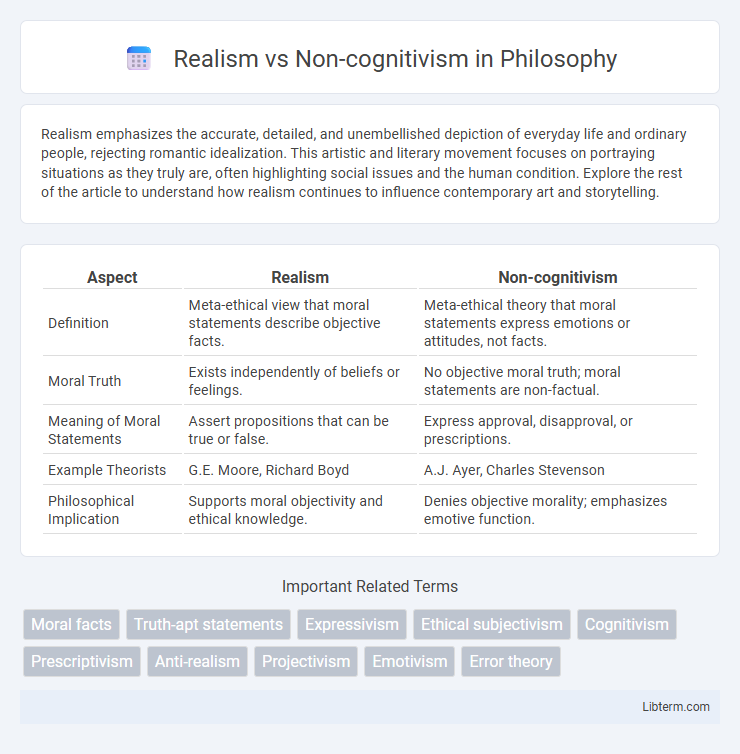Realism emphasizes the accurate, detailed, and unembellished depiction of everyday life and ordinary people, rejecting romantic idealization. This artistic and literary movement focuses on portraying situations as they truly are, often highlighting social issues and the human condition. Explore the rest of the article to understand how realism continues to influence contemporary art and storytelling.
Table of Comparison
| Aspect | Realism | Non-cognitivism |
|---|---|---|
| Definition | Meta-ethical view that moral statements describe objective facts. | Meta-ethical theory that moral statements express emotions or attitudes, not facts. |
| Moral Truth | Exists independently of beliefs or feelings. | No objective moral truth; moral statements are non-factual. |
| Meaning of Moral Statements | Assert propositions that can be true or false. | Express approval, disapproval, or prescriptions. |
| Example Theorists | G.E. Moore, Richard Boyd | A.J. Ayer, Charles Stevenson |
| Philosophical Implication | Supports moral objectivity and ethical knowledge. | Denies objective morality; emphasizes emotive function. |
Understanding Realism in Meta-Ethics
Realism in meta-ethics asserts that moral facts exist independently of human beliefs or emotions, grounding ethical truths in objective reality. This position contrasts with non-cognitivism, which denies that moral statements express propositions capable of being true or false, viewing them instead as expressions of attitudes or prescriptions. Understanding realism involves recognizing its commitment to moral objectivity, offering a framework where ethical claims can be evaluated for truth based on external facts.
Defining Non-cognitivism: Key Concepts
Non-cognitivism defines moral statements as expressions of emotional attitudes or prescriptions rather than objective factual claims, denying truth-apt qualities. Central concepts include emotivism, where moral language conveys approval or disapproval, and prescriptivism, where it functions as imperatives urging action. This metaethical theory contrasts sharply with moral realism by rejecting the existence of objective moral facts.
Historical Development of Realism and Non-cognitivism
Realism in metaethics historically emerged from Plato and Aristotle's belief in objective moral truths that exist independently of human opinion, gaining prominence in the 20th century through G.E. Moore's idealistic moral realism. Non-cognitivism arose as a reaction during the early 1900s with the rise of logical positivism and emotivism, notably advanced by A.J. Ayer and C.L. Stevenson, who argued moral statements express emotions rather than factual propositions. The historical development of these views reflects a broader philosophical shift from metaphysical moral foundations to linguistic and psychological analyses of ethical language.
Main Arguments for Moral Realism
Moral realism asserts that moral statements describe objective facts independent of human beliefs or emotions, supported by arguments such as the argument from moral experience, which holds that people naturally perceive some moral truths. The argument from moral progress emphasizes that societal improvements imply the existence of objective moral standards guiding such advancements. Furthermore, the argument from disagreement contends that deep and persistent moral disagreements suggest underlying objective truths rather than mere subjective opinions.
Central Claims of Non-cognitivist Theories
Non-cognitivist theories assert that moral statements do not express propositions that can be true or false but rather convey emotional attitudes or prescriptions. These central claims emphasize that ethical language functions to influence behavior or express approval and disapproval rather than describe moral facts. Non-cognitivism challenges the realist view by denying the existence of objective moral truths and viewing moral discourse as fundamentally non-descriptive.
Realism vs Non-cognitivism: Core Differences
Realism asserts that moral facts exist independently of human beliefs, grounding ethics in objective truths, whereas non-cognitivism denies the truth-apt status of moral statements, viewing them as expressions of emotions or attitudes rather than factual claims. Realists argue for an external moral reality discoverable through reason or intuition, while non-cognitivists emphasize the non-descriptive function of moral language, highlighting its role in influencing behavior or expressing approval and disapproval. The core difference lies in realism's commitment to moral objectivity versus non-cognitivism's rejection of moral truth, shaping contrasting views on the nature and function of ethical discourse.
Strengths of Realist Approaches
Realist approaches in meta-ethics provide a robust framework by grounding moral truths in objective, mind-independent facts, which enhances the coherence and universality of ethical discourse. Their strength lies in offering a stable foundation for moral claims, supporting rational moral debate and enabling consistent ethical judgments across diverse cultures and contexts. Empirical support from cognitive science and moral psychology further bolsters realism by demonstrating how humans naturally perceive certain moral principles as objectively binding.
Critiques and Challenges to Non-cognitivism
Non-cognitivism faces significant challenges, notably the Frege-Geach problem, which questions how moral statements can maintain logical consistency across complex arguments if they merely express emotions or attitudes rather than truths. Critics argue that non-cognitivism struggles to account for moral reasoning and disagreement, as it denies objective truth values to ethical claims, undermining meaningful debate. Furthermore, the difficulty in explaining moral motivation and the apparent objectivity of moral experiences remains a persistent critique against non-cognitivist theories.
Contemporary Debates: Realism and Non-cognitivism
Contemporary debates on realism and non-cognitivism center around the nature of moral language and its truth-apt status, with realists arguing that moral statements express objective truths about moral facts, while non-cognitivists maintain that moral utterances primarily convey emotional attitudes or prescriptions without truth value. Key figures in these debates include moral realists like David Brink, who defend robust moral ontology, and non-cognitivists like Simon Blackburn, who propose quasi-realism to explain moral discourse without commitment to objective moral facts. The ongoing discourse addresses challenges such as the Frege-Geach problem and the epistemology of moral knowledge, shaping evolving metaethical frameworks that impact normative ethical theories.
Implications for Moral Discourse and Practice
Realism asserts that moral statements express objective truths, providing a stable foundation for ethical debates and practical decision-making. Non-cognitivism holds that moral utterances merely convey emotions or prescriptions, undermining the possibility of rational moral disagreement or justification. This distinction shapes how individuals and societies approach moral discourse, influencing the authority and effectiveness of ethical reasoning in guiding behavior.
Realism Infographic

 libterm.com
libterm.com